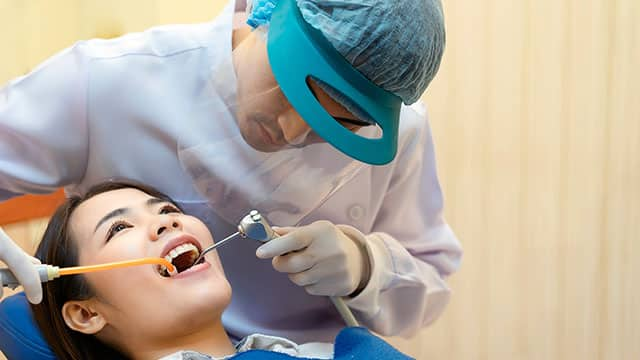-
-

FLUORIDE
What Is Stannous Fluoride Toothpaste?Discover what is Stannous Fluoride Toothpaste and its importance to prevent cavities and other oral health problems.

TEETH WHITENING
Whitening toothpaste - hydrogen peroxide vs. carbamide peroxideIf you lose one or more of your front teeth due to injury or decay, you may feel ...
-
Science & InnovationOral Health Commitment
- Oral Health Commitment
- Bright Smiles, Bright Futures
- Educational Resources
- Mobile Dental Van
- Volunteer
- ORAL HEALTH CHECK
- PRODUCT MATCH
- Oral Health and Dental Care | Colgate®
- Oral Health
- Is Tooth Drilling Necessary In Dental Treatment?


If you've been to the dentist and found out that you have cavities, you may be feeling nervous about the treatment. Will the dentist use a drill? Cavities are one of the most common dental health issues, but they can be treated and avoided. Traditionally your dental professional would use a drill during this procedure. Luckily, there are alternative methods that you can speak to them about. There is no need to avoid the dental office as early treatment of dental issues can prevent more serious conditions.
Tooth Drilling Procedure
A dental drill is a mechanical tool that dental professionals use to clean decayed enamel and dentine. Tooth decay or cavities occur when the bacteria in the mouth combine with sugar, which produces acids that breakdown tooth enamel.
If you are scheduled for a cavity filling, your dental professional will need to remove the tooth's damaged area before starting the procedure. Generally, they would use a drill, which may be painful for some people. To reduce discomfort, they may administer an anesthetic. Tooth drilling is also used for root canals and dental implant procedures.
Other Tooth Drilling Technologies
As newer technologies (including the use of lasers) become available in the future, consult your dentist for further information. While dental professionals sometimes use these technologies, their safety and effectiveness are not yet supported by organizations like the American Dental Association overall.
If you're concerned about the use of drills, rest assured that dental professionals are specially trained to put you at ease and help manage your anxiety. It's a good idea to be honest and upfront about any reservations you have regarding treatment so they can best address them make you feel comfortable.
How To Prevent Decay
Although most people can develop tooth decay or cavities, these dental issues can be avoided with easy everyday habits. You can maintain good oral health by brushing your teeth twice a day. Interdental cleaning is important as it removes plaque and food particles between your teeth. Regular dentist appointments will help to identify and treat dental problems.
Tooth drilling may sound scary, but it is always a good idea to take care of dental issues like tooth decay as soon as possible. With different dental treatment options available for various procedures, you may be able to avoid the drill. It's a great idea to consult your dental professional about alternative methods; they can explain exactly what will happen and help you calm your nerves.
Oral Care Center articles are reviewed by an oral health medical professional. This information is for educational purposes only. This content is not intended to be a substitute for professional medical advice, diagnosis or treatment. Always seek the advice of your dentist, physician or other qualified healthcare provider.
Related Articles

Fillings
Is Tooth Drilling Necessary In Dental Treatment?Tooth drilling is often necessary to take care of a cavity, but new technologies including plasma jets or lasers could make it a thing of the past.

Fillings
How Long Does It Take to Fill a Cavity?How long does it take to fill a cavity? While getting a cavity isn't fun, the treatment only takes about an hour, so book a visit with your dentist.

Fillings
What Happens When Your Child Gets a Filling?Going to the dentist is a regular event, but it can be stressful if you or your kids get sensitive teeth after filling work. Here's how to make it easier.

Fillings
Let's Compare Metal vs. Metal-Free FillingsHearing that you have a cavity can be upsetting, but there are many types of fillings that can solve the problem. Learn more about metal-free fillings.
Related Products

Colgate Total Active Prevention Whitening Toothbrush is a soft toothbrush with charcoal infused spiral and Floss-Tip bristles (1). This soft bristle toothbrush fights the root cause* of cavities, plaque, gingivitis, bad breath, tartar buildup**, and stains*** and also helps remove surface stains to prevent stain buildup.

Power away plaque with Colgate Total Battery Powered Toothbrush. This battery operated toothbrush for adults fights the root cause* of cavities, plaque, gingivitis, bad breath, tartar buildup**, and stains***. Plus, this battery toothbrush has a built in 2 minute timer and features two cleaning modes, Sensitive and Regular, to cater to your unique oral care needs.

The Colgate Total® Active Prevention Foaming Clean Soft Bristle Toothbrush is specially designed to tackle the root cause* of cavities, plaque, gingivitis, bad breath, tartar buildup**, and stains***.

Colgate Total Alcohol Free* Gum Health Mouthwash delivers 24-hour protection** against bacteria and also helps prevent gum problems

Helping dental professionals
More professionals across the world trust Colgate. Find resources, products, and information to give your patients a healthier future




